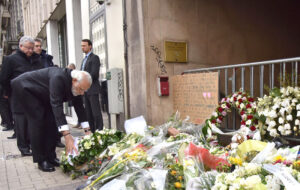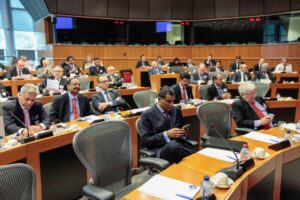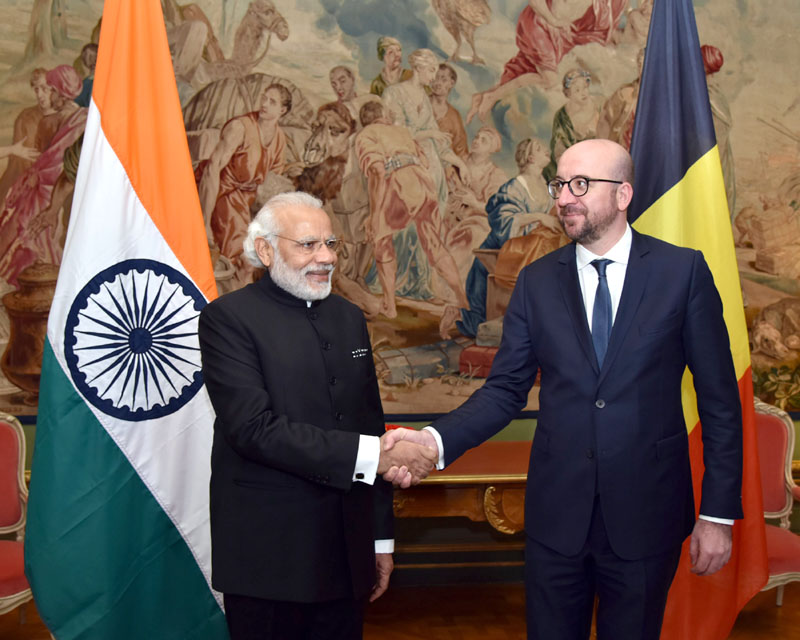Belgium-India Relations: Exploring New Horizons
A relationship between two countries is like a coin. One side of the coin represents trade and economic relations and the other represents bilateral political and strategic ties. No relationship can be long-standing or develop deeper and broader, if one of the two sides of the coin is ignored.
In the context of relation between Belgium and India, this has been an extraordinary accomplishment. Over the decades, both countries have formed an axis of cooperation, they share a dynamic and multifaceted relationship and are now exploring new horizons. Belgium has a very interesting past in India and India has an interesting present in Belgium. Relationship between India and Belgium can be characterised as relation between two countries with shared values of democracy and freedom.
Belgium’s support for reform in the United Nations and a permanent seat for India in the UN Security Council speaks of this shared vision. Also, Belgium’s support to India on the Nuclear Suppliers Group issue will go down in the history as one of the most important milestones in India-Belgium relations.
Immediately after India’s independence from British rule in 1947, Belgium was the first country to establish diplomatic relations by opening its Embassy in New Delhi. Since the establishment of diplomatic relations, several high-level bilateral visits have taken place between the two nations which has served as a catalyst to further enhance the already cordial ties. Strategic convergence between India and Belgium runs deep and with every high-level bilateral visit, the ties have been bolstered further, even as both nations watch the current turbulent international landscape. War in Ukraine is one of them. To deepen their ties, on February 25, 2022 a special logo was unveiled in New Delhi to commemorate 75 years of diplomatic relations between them.
Relationship founded on agreements and treaties
There are several bilateral agreements and treaties between India and Belgium. Science & Technology cooperation, cultural cooperation, cooperation in the field of renewable energy, cooperation in education is amongst those which have helped their relations to blossom. In the education sector especially, Belgium offers large number of study programmes in English for prospective students from India at its universities and colleges. Currently, well over 750 Indian students are pursuing their education at various Belgian universities. The country is also keen to promote itself as a preferred tourist destination for the sizeable outbound Indian tourism market.
Over the years, the two nations have identified and worked on new areas of cooperation to make the ties grow broader and deeper. Currently, the bilateral trade comprises diamonds, pharmaceuticals, chemicals, foodstuff, and machinery. The trade volume reflects the close economic partnership between the two countries. About 170 Belgian companies are based in India, whereas around 80 Indian companies have their footprint in Belgium. India is among the 10 most important partners of the Port of Antwerp.
India and Belgium share a strong trading links including bilateral relations and there is a culture of enterprise and flexibility on both sides. India is the second largest importer of Belgian products and is also the fifth largest exporter to Belgian products. A mini-India lives in Antwerp.
The India-Belgium Luxembourg Economic Union (BLEU) serves as a powerful instrument to deepen trade and economic ties between the two countries. Although total trade between Belgium and India in 2021 stood at Eur 12.3 billion, there is room for increasing this by exploring new areas of business. Highly qualified professionals working in Belgium are from Indian software companies, like TCS, Infosys, Wipro, HCL and Tech-Mahindra. TCS has been ranked as a top employer among certified companies in Belgium. There is big scope for diversity in trade and business beyond software and diamonds.
Sectors like chemicals, pharmaceuticals, machinery, and equipment are becoming interesting to the bilateral trade. Belgian chocolates and beer are very popular in India. High skilled professionals from India form the single largest non-European diaspora in Belgium and they are productively contributing to Belgium’s economic development.
In terms of cultural ties, the partnership with Europalia International to hold the Europalia-India festival in 2013 in Brussels was uniquely appropriate.
An important element showcases how close the bilateral ties are, not just economically or socially, but also political. On March 30, 2016, when Indian Prime Minister Narendra Modi landed in Brussels, he became the first executive head of any foreign government to visit Belgium, days after the country had been wracked by unprecedented terror attacks on March 22, that led to 32 deaths and injured over 300 persons.

Modi paying homage to victims of terror attack at the Maelbeek Metro station, in Brussels, Belgium on March 30, 2016. (Photo: PIB)
On the visit, Modi held a bilateral summit with his Belgian counterpart Charles Michel and offered India’s condolences and support at that critical juncture. He also attended the 13th European Union-India Summit in Brussels. The presence of Indian Prime Minister at a time when entire Europe had been gripped by terror and there was no certainty about when or where the next attack may take place, went on to show the importance that India attaches to its key partners and that it stands by them firmly even in the worst of the times. India could easily have begged off the visit and sought postponement, citing the security situation. However, India did not and covered the distance to meet its European partners in the most difficult period for the continent.
The gesture was not unnoticed and the subsequent closure of the “Kashmir Centre” in Brussels showed that India’s message had reached Europe loud and clear. The closure of a centre that was a thinly-veiled front for Pakistan to mount constant attacks on India in Europe has helped take Indo-Belgian relations to a new level. It had taken years to convince the Belgian authorities that the “Kashmir Centre, funded by Pakistan Intelligence was helping fundamentalism in the name of human rights threatening peace and security in Belgium.
A history of protecting Belgium
Modi’s visit was symbolic of Indian support to Belgium that has continued over the past century. While in 2016, India did not step into the trenches, Belgians and Europeans all remember and would do well to remember for eternit that way back in 1914, over 50,000 Indian soldiers had laid down their lives in the battlefields of Flanders during the World War I when Indian contingent as part of the Allied armies of Belgium, France and Great Britain took on the immense strength of invading German Army. A memorial in the honour of Indian soldiers who had laid down their lives during the First World War defending the Channel Harbour and the territory of Belgium, will remain a living monument of the services the Indian soldiers.

Business meetings, like this hosted by Europe India Chamber of Commerce, open new opportunities for both nations (Photo: EICC)
Grasping new opportunities ahead
Going forward, too, there is a lot that India has to offer to Belgium. The Indian services sector, mainly the Information Technology giants present in Belgium, has exhibited significant resilience, posting growth even during Covid-19.
But the sector could grow much faster and even the services other that IT have a vast potential for growth in Belgium, especially the opportunities thrown up by the increasing old age population in the country. The age dependency ratio of Belgium has been steadily increasing and now stands at almost 30.10 pc. While Belgium has a good social security system, it is almost certain to come under much greater strain going ahead. This is an area where India can explore by offering other services, including hospitality, healthcare and other areas where an ageing society would need assistance and greater manpower.
With ageing population, various European nations have been suffering from a shortage of manpower, trained or otherwise, for even basic needs of the society. The situation has worsened to a critical level in the aftermath of the Covid-19 pandemic as businesses ranging from hospitality to healthcare, transport to tourism have been struggling to find manpower. So serious is the situation that it has put brakes on the broader economic revival of the developed countries.
This is an area where India can and is willing to help. It has an abundance of skilled and semi-skilled manpower that could easily power the European economies ahead for years, if not decades.
Belgium already has a good experience of dealing with Indian workers as the Indian community in Belgium has been at the core of EU-India trade relations and they have integrated into the Belgian society in all spheres.
The contribution of Indian diaspora in Belgium needs to be perceived in a broader framework of international interaction and as a part of the EUIndia strategic partnership. According to the latest estimates, around 25,000 members of the Indian diaspora live in Belgium. To make their lives easier, India and Belgium concluded a bilateral agreement on social security on November 3, 2006 and the Social Security Agreement between the Kingdom of Belgium and the Republic of India entered into force on September 1, 2009.
The SSA is considered as a landmark agreement as it was the first treaty of its kind signed by the Indian authorities. In fact, this agreement has served as a benchmark for similar agreements that India entered with other countries. This agreement has been greatly helpful to Indian companies who are actively engaged in business in Belgium, or elsewhere in Europe while using Belgium as their platform. Moreover, the SSA has been helpful to Indian individuals who have worked in Belgium, are working or who will envisage working in Belgium as well as the Belgian nationals working or planning to work in India.
Apart from the strong bonds linking India and Belgium in the fields of trade, Indian cultural influences are apparent throughout Belgium’s history. Indian organic, spiritual and visual cues through textiles, miniatures with Ottoman and Mughal architecture and gardens in Indian palaces and concept of total art inspired the Belgian Art Nouveau movement in many ways and going forward to this day that is becoming increasingly apparent in many cultural expressions.
To strengthen these ties further, it is high time that at least some Indian metro cities are connected through direct air link with Brussels. Many Indian carriers are already operating in Europe, and it would help if they could consider directly linking Brussels with Indian metro cities. As India celebrates Azadi Ka Amrit Mahotsav or its 75th anniversary of independence, it is important that India and Belgium further deepen their bilateral ties and explore their priorities in the next decade.
It is hoped that both democracies will continue to stand together to defend the rulesbased order, advance a robust trade and economic relations and address the challenges that the world is facing. India has assumed the Presidency of the G20 from December 1. The G20 presidency is indeed a watershed moment for India as it seeks to play a crucial role in addressing pragmatic solutions to the ongoing global turmoil, besides food and energy security. This offers Belgium a unique opportunity to collaborate with India to contribute to the global agenda on pressing issues of international importance. Belgium is uniquely placed to play an important role in the ongoing EU-India free trade negotiation.
Sunil Prasad is secretary general of the Europe India Chamber of Commerce and lives in Brussels.










